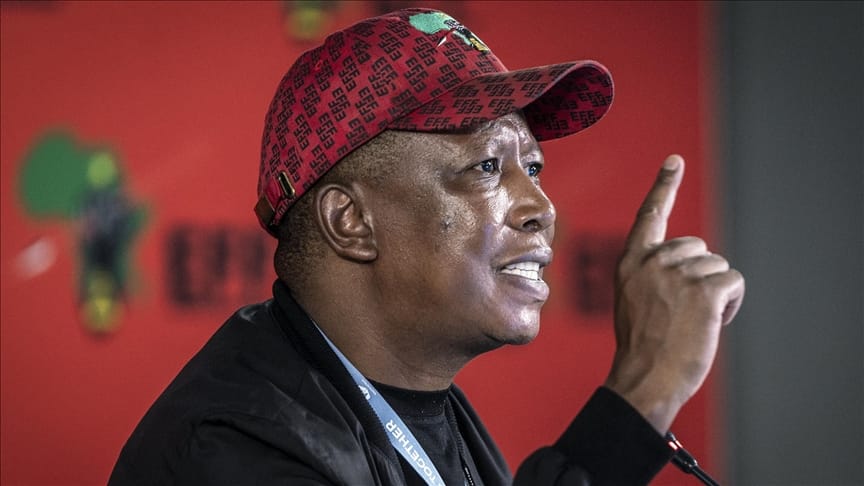Julius Malema, leader of South Africa’s far-left Economic Freedom Fighters (EFF), has strongly pushed back against calls from former U.S. President Donald Trump demanding his arrest over chanting the controversial liberation song “Kill the Boer, Kill the Farmer.” Speaking to a large crowd during a Youth Day rally in Durban on Monday, Malema accused Trump of fearing the political power and growing influence of his party.
“Comrades, let us build a strong organization,” Malema said, rallying supporters. “This EFF party scares even Donald Trump. It scares Elon Musk too,” he added, suggesting that the party’s message and momentum have rattled powerful global figures.
The rally took place as South Africa commemorated Youth Day, which marks the 1976 Soweto uprising where black schoolchildren protested the apartheid regime’s education policies. Malema used the occasion to underline his party’s anti-imperialist stance and draw parallels between past struggles and current political battles.
Tensions with the United States
The dispute stems from a meeting last month between Trump and South African President Cyril Ramaphosa at the White House, where Trump raised concerns over alleged violence against white farmers. During the closed-door meeting, Trump reportedly urged Ramaphosa to take legal action against Malema, accusing him of promoting hatred and incitement through the controversial song.
According to sources, Trump even dimmed the lights in the room and played a video of Malema chanting the song, demanding to know why he had not been arrested. Trump alleged that the chant contributed to what he called a “white genocide” in South Africa, claiming white farmers were fleeing to the United States due to fear of persecution.
President Ramaphosa rejected those claims outright, maintaining that there is no coordinated violence or systematic dispossession targeting white South Africans. He emphasized that South Africa’s constitution guarantees freedom of expression and that the song in question is part of the nation’s historical record of resistance.
Song as Symbol of Struggle
Malema defended the controversial chant by framing it within the context of South Africa’s anti-apartheid legacy. “The song was not composed by me,” he told the crowd. “It is a song that speaks to our struggle. It is about resistance against oppression. No one will silence us. It is part of who we are. We will continue singing it—it is our heritage.”
He was emphatic that the song should not be interpreted literally, a position echoed by Ramaphosa days earlier when he said that singing struggle songs cannot be equated with inciting violence.
Malema also challenged the United States’ role in commenting on internal South African matters. “We must not allow the U.S. to tell us how to run our country,” he said. “We are not answerable to Washington. We are answerable to our people.”
Land and Reconciliation
In rejecting the idea that the song promotes violence, Malema addressed broader issues of inequality and land reform. “No one is saying white people must be killed,” he told supporters. “We want to live peacefully with white South Africans. But peace is not possible unless land stolen during colonization is returned. That is the conversation we are having—not violence, but justice.”
Criticism of Elon Musk and Starlink
Malema also criticized tech billionaire Elon Musk, who has promoted his satellite internet company, Starlink, across Africa. The EFF leader warned that as long as Starlink fails to meet South African legal standards, it will not be allowed to operate in the country. “Starlink will never function in South Africa while the EFF is here and while it refuses to comply with the laws of this country,” he said, reinforcing his party’s position on foreign companies operating within national regulatory frameworks.
Solidarity with Palestinian Children
Malema drew historical parallels between South Africa’s anti-apartheid youth and children in Palestine, expressing solidarity with Palestinian resistance. Referring to the Soweto uprising, where dozens of students were killed by apartheid police for protesting against Afrikaans as a language of instruction, he said, “The youth of 1976 were killed for standing up for their land and their rights.”
He added, “Palestinian children today are fighting for the same thing—their land, their dignity. We stand with them. We know what it means to suffer under occupation. We have lived it. We will never abandon their struggle.”
Call for African Unity
In closing, Malema reiterated a long-standing EFF proposal: the formation of a united Africa. He called for the establishment of a continental army, a shared currency, a common parliament, and a single African president who can speak and act on behalf of the continent.
“True liberation will only come when Africa is united—militarily, economically, and politically,” he said. “Only then will we be able to chart our own future, free from outside interference.”
The speech reinforced the EFF’s radical platform and Pan-Africanist vision, underscoring Malema’s defiance in the face of international criticism and his continued push for economic justice and self-determination across the continent.



